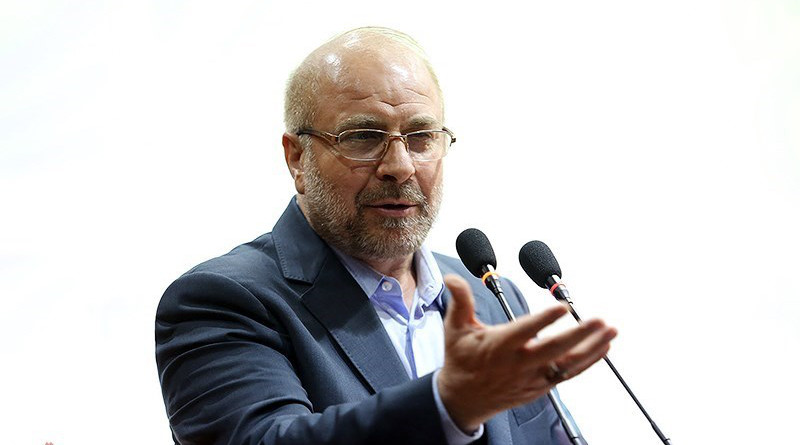Iran: Parliament Speaker Under Fire Over Family’s Reported Shopping Spree In Turkey
By RFE RL
By Golnaz Esfandiari
(RFE/RL) — Iran’s parliament speaker Mohammad Baqer Qalibaf is facing calls to resign after members of his family were reported to have gone on a recent shopping spree in Turkey.
The family’s reported splurge has triggered widespread outrage in Iran, where many are struggling to make ends meet in a decimated economy that has been crushed by crippling U.S. sanctions and years of mismanagement.
Social media reports suggested that Qalibaf’s wife, daughter, and son-in-law returned from Istanbul to Tehran on April 19 with excess luggage that included baby clothes and accessories, including a crib and stroller.
Iranians have accused Qalibaf of hypocrisy. The former Tehran mayor has pledged to serve underprivileged Iranians and in the past condemned Iranian officials who travelled abroad on shopping trips. The 60-year-old has not publicly reacted to the uproar. But his son has said his father had opposed the trip.
Those comments have done little to curb the tide of criticism directed at Qalibaf, who became the speaker of Iran’s parliament in 2020.
‘Moral Collapse’
During protests in dozens of Iranian cities and towns on April 21, Iranian teachers demanding better pay and work conditions appeared to chant slogans against Qalibaf. “Let go of the layette, cure our pain,” teachers were heard chanting in amateur videos posted on social media.
In an April 21 editorial that appeared on its front page, the reformist daily Aftab-e Yazd called on Qalibaf to step down. “At a time when Iranians are barely managing to survive, the parliament speaker’s wife and daughter visited Turkey to buy a layette,” the daily wrote.
The conservative news site Khabaronline.ir said the trip highlighted “the moral collapse of governance” in the Islamic republic, where government functionaries often claim to live modest lives. In recent years, amid the deteriorating economic situation, officials have called on Iranians to resist Western pressure and tighten their belts.
“Buying baby accessories from Turkey or any other country is not a crime or a sin,” Khabaronline.ir said in an April 21 editorial. “But lies and hypocrisy… are ugly, and this is what has devastated Iranian politics and power.”
Tehran-based analyst Abbas Abdi, commenting on Twitter, said the controversy is “so important and devastating that [Qalibaf] has to resign.”
In a bid to highlight Qalibaf’s apparent hypocrisy, Iranian social media users have widely shared videos of a TV presidential election debate in 2017, during which he blasted a minister for reportedly traveling to Italy to buy baby clothes.
“Our education minister buys baby clothes from Italy. Do you think that will help our economy? Never,” Qalibaf said during the debate in a public show of support for domestic production.
Iranian activist Vahid Ashtari, who has revealed details of the Qalibaf family’s trip to Turkey, said on Twitter that it was inconceivable for a sitting official who has “given speeches about domestic production” to then “send his family to Turkey to buy a layette.”
The reformist Shargh daily said the controversy highlighted why parliament, which is dominated by hard-liners, has been pushing for a draconian Internet bill that could increase online censorship and further restrict Internet access.
“The free flow of information is not something [authorities] like,” the daily wrote in an editorial. “If, contrary to their promises and slogans, their family travels to Turkey to buy a layette then photos and videos are posted online in a second, exposing them to the public eye.”
‘Unforgivable Mistake’
In a post on Instagram, Qalibaf’s son, Elias, called the trip “an unforgivable mistake” and claimed that his father’s opposition to the trip had been “ignored.”
“This trip amid the current economic conditions was definitely wrong,” he said, denying reports that the family had purchased a layette. He said social media reports contained “inaccuracies and exaggerations.”
Mohammad Saeed Ahadian, Qalibaf’s political and media adviser, accused the parliament speaker’s critics of exaggeration and said that “a father cannot be blamed for his child’s deeds.”
Mahmud Razavi, Qalibaf’s cultural adviser, claimed the uproar over the trip had been orchestrated. “No one knew about the pregnancy of Qalibaf’s daughter and there was no way to find out other than intelligence gathering,” he said.
Qalibaf — a one-time aerospace commander of the Islamic Revolutionary Guards Corps (IRGC) and a former Tehran police chief — faced allegations of corruption during his tenure as mayor of the Iranian capital from 2005 to 2017. He has denied any wrongdoing.
An audio file leaked to RFE/RL’s Radio Farda appeared to suggest that, during his stint as mayor, Qalibaf had offered to sign a phony contract with the IRGC to cover up an 80 trillion-rial (about $2 billion at the time) shortfall discovered during an audit of the Cooperative Foundation.
The foundation is one of the many opaque state-funded trusts in Iran that the IRGC, a branch of the Iranian military, employs to exert significant influence on the domestic economy.
Issa Sharifi, Qalibaf’s former deputy, was sentenced to 20 years in prison in March 2021 and fined for financial fraud over the same case. Qalibaf has not faced any charges.
- Golnaz Esfandiari is a senior correspondent with RFE/RL.

